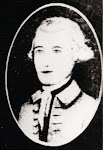Edwin Godwin Reade (1812-1894)
by Thomas R. Tillett
February, 1993
Edwin Godwin Reade, in the opinion of the author, was by far the most prominent, distinguished and benevolent of any of the Reades that ever came out of Person County.
The second son of Robert Richard Reade and his 2nd wife, Judith Anderson Gooch, Edwin G. Reade was born in the Mt. Tirzah area of Person county on 13 Nov 1812. His father had migrated to the Mt. Tirzah area from Isle of Wight county, VA, as a young man. Edwin Reade had 8 half-brothers and –sisters from his father’s first marriage. (One of these half-sisters was Mary Payne Reade who married Sidney Moore, son of Stephen Moore, and who was my great-great-grandmother.) After the death of his first wife, Robert Richard Reade married Judith Anderson Gooch, daughter of John Gooch. Edwin G. was the middle of three sons born of this marriage. His younger brother, Washington F. Reade, was my great-grandfather.
Edwin G. Reade’s father died when Edwin was 4 years old. His mother, and educated woman for her day, gave Edwin the rudiments of education at home. Some years later, Edwin G. Reade built for his mother (who was by then a cripple) a home especially designed so that she could move around in it.
At age 18, Edwin G. left his mother’s farm and started out to get an education by his own exertion. He entered the academy of George Morrow, in Orange county, and later the academy of Rev. Alexander Wilson, in Granville county, as assistant teacher. Although these academies had well prepared Edwin for college, he never became a student at a formal university. Instead, at age 21, he returned to his mother’s home and began the private study of law. He read the books of Benjamin Sumner, a retired lawyer, who kindly loaned them to him, and who occasionally examined his progress. Edwin received his license to practice law in 1835 (in the same manner that his contemporary, Abraham Lincoln was to obtain his law license a year later.) After the receipt of his license to practice law, Edwin G. Reade began a long and distinguished career in law, politics, banking, business and philanthropy that was to last for almost 60 years.
Some of the titles which Edwin G. Reade held and honors which he received consist of the following:
· Lawyer
· Magistrate
· Chief Justice of Person County Court
· Member of State Legislature
· Justice of North Carolina Supreme Court
· Representative in U.S. Congress from NC
· Senator in the Confederate Congress
· President of the State Convention to form a new constitution and return to the Union
· Recipient of an honorary LLD degree from UNC
· Grand Master of the Masons (two terms)
· President of the NC Bar Association
· Elder in the Presbyterian Church for 30 years
· President of 2 banks (I have in my possession a well-worn $5.00 bank note, dated 1862, drawn on the Bank of Roxboro and signed by Edwin G. Reade, President.)
When Abraham Lincoln was elected President in 1860, Judge Edwin Reade was asked if he would consider serving on President Lincoln’s Cabinet. Judge Reade declined but did later serve a short term as a senator in the Confederate Congress.
Judge Reade became a distinguished writer and also gained wide fame as an orator. He delivered the addresses at the laying of the cornerstones at the U.S. Post Office at Raleigh and the Oxford Orphanage in Oxford, NC. Judge Reade is also remembered for his addresses to the NC Bar Association in Asheville in 1884, and Raleigh in 1886.
Edwin G. Reade was first married in 1836 to Emily Ann L. Moore, the daughter of Phillips Moore and granddaughter of Stephen Moore. Emily died in 1871 and is buried in the Moore-Reade family cemetery at Mt. Tirzah. Later that same year, Edwin G. Reade married a widow, Mary E. Parmele. Although Judge Reade had no children of his own by either wife, his “family” became the sons and daughters of his two brother. For the education of this family, Judge Reade endowed and had built the “Readeland Academy” at Mt. Tirzah.
Just as Edwin G. Reade had been benevolent to his adopted family of nieces and nephews during his lifetime, so was he most generous to them at his death. His will designated inheritances to 49 nieces, nephews, grand-nieces and grand-nephews. Among those who inherited a token from “Uncle Ned” was my mother, Sue Bettie Reade, who was 7 years old when he died.
Edwin G. Reade died in Raleigh on 18 October 1894 at age 82. He is buried in Raleigh. A historical marker in memory of Edwin G. Reade is located along Highway 501 South in the Timberlake area.
To quote an article in a Raleigh newspaper written during Judge Reade’s later years: “Judge Reade was plain, direct, straightforward, conscientious. He has risen by the force of his own effort and will power from a humble station to distinction and eminence and wealth. His life is radiant with good deeds. To many persons in distress and need and sorrow, he has given a brightened life and his charities have always been done in secret. A God-fearing man from his youth; of simple, unostentatious manners, he has spent a long life in the performance of his duties to God and man.”
_________________________________________________
This article originally appeared in the Moore/Stanford/Webb Chronicles in volume 7, #2, 1999. Thomas Reade Tillett died on January 20, 2008, age 83, and is buried in the Mt. Tirzah United Methodist Church cemetery.
Subscribe to:
Post Comments (Atom)









No comments:
Post a Comment